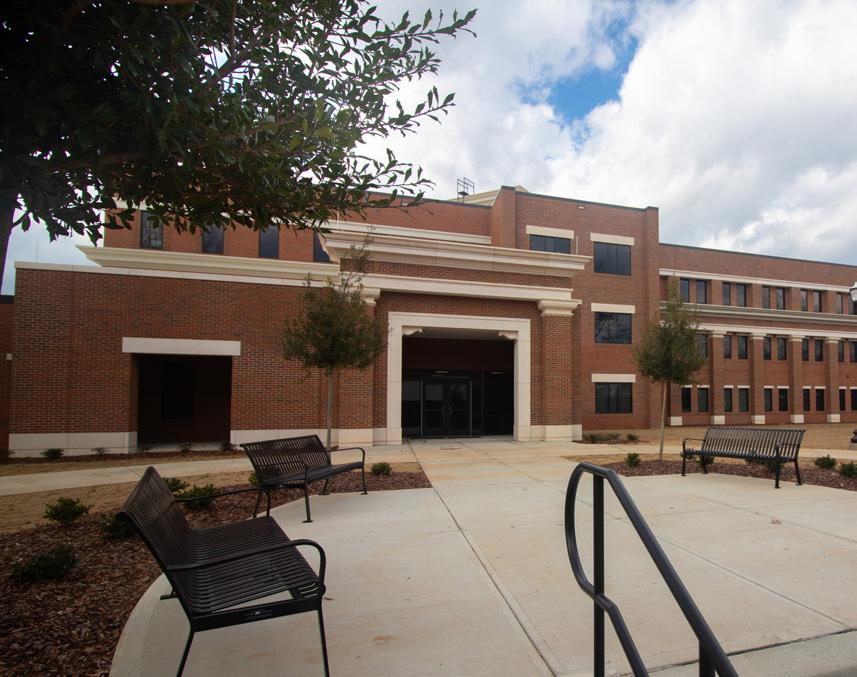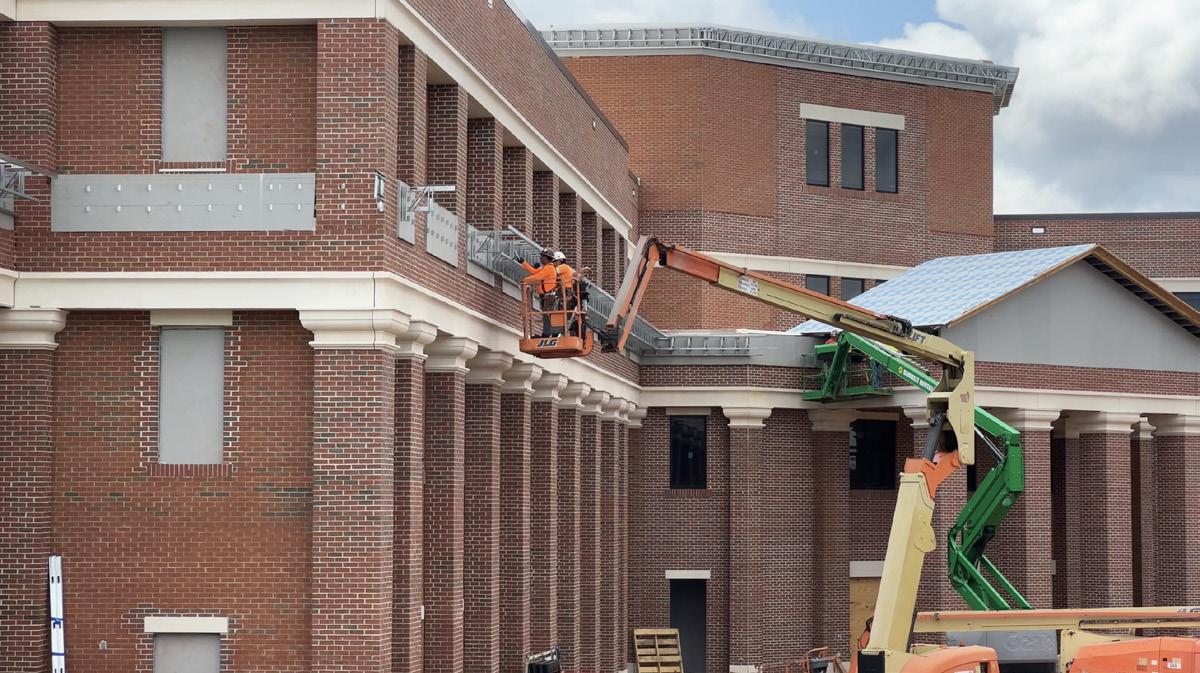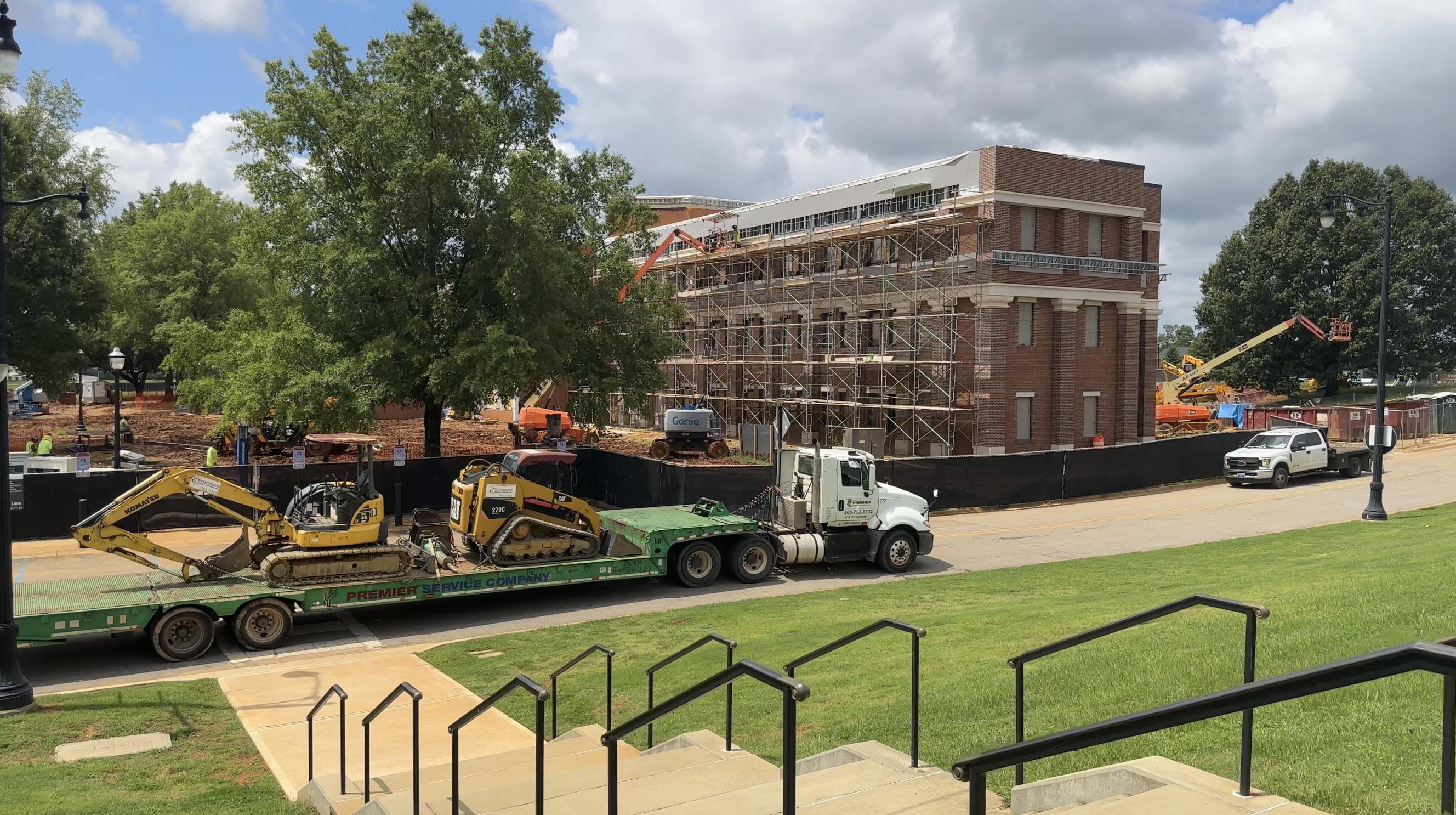Alabama Transportation Institute
EXECUTIVE SUMMARY ANNUAL REPORT



Welcome to the Alabama Transportation Institute Annual Report Executive Summary for Fiscal Year 2023, covering the period from October 1, 2022, through September 30, 2023.
I am pleased to share the exciting developments and achievements of the Alabama Transportation Institute (ATI) over the past year. We have achieved 50% growth in our research awards, exceeding $27 million, with federal funding playing a significant role in this success.
A notable milestone is our collaboration with UCLA and Carnegie-Mellon University to lead the New Mobility Center of Excellence, a project awarded by the Federal Highway Administration. This center aims to spearhead national-level research on integrating new technologies, such as autonomous vehicles, to enhance the safety, efficiency, and effectiveness of our transportation system. ATI was brought into the team to explicitly address specific challenges and opportunities facing rural regions and small towns as they look towards a better transportation future.
Our involvement in two successful University Transportation Center (UTC) teams, representing $50 million in federal funding for transportation research, with ATI directly receiving $5 million, further highlights ATI’s growing influence on the national stage. The UTC program is one of the most prestigious and highly competitive research efforts sponsored by the USDOT. In addition, our strong presence at scientific conferences, including the Transportation Research Board annual meeting in Washington, DC, part of the respected National Academy of Sciences, where we presented 47 papers, reinforces our commitment to
producing high-impact research with national significance. Also, ATI researchers secured 12 grants this year from the prestigious National Science Foundation, resulting in millions in research funding, illustrating its ability to conduct nationally significant research.
As we look toward the future, ATI’s Alabama Mobility and Power Center (AMP) is expanding, with plans to establish a battery lab and the National Electric Vehicle Training Center. These initiatives position UA as a national leader in electric vehicle technologies. This, in turn, sets the stage for attracting significant federal and private sector funding in workforce, research and education.
The completion of the Smart Communities Innovation Building marks a pivotal moment for ATI. This facility, referred to as SCIB, is now home to ATI leadership, AMP, the Transportation Policy Research Center (TPRC), the Center for Transportation Operations, Planning and Safety (CTOPS), as well as numerous faculty and students from the UA College of Engineering. Notably, the expanded West Central Region Traffic Management Center within SCIB enhances collaboration with the Alabama Department of Transportation (ALDOT), creating opportunities for federal funding pursuits, internships, and improved traffic management in and around Tuscaloosa.
While this year focused on nationally competitive research, ATI is equally dedicated to serving the
state of Alabama directly. Initiatives such as the ACTION project along I-20/59 and PROACT, on I-65 in the Cullman area, will address traffic safety and operational challenges and exemplify our commitment to making a tangible impact. Collaborations with the Regional Planning Commission of Greater Birmingham to secure a SMART grant from USDOT, as well as our role in advising the Joint Study Commission on Advanced Air Mobility, demonstrate our multifaceted approach to state service.
In addition, ATI has actively supported the Alabama League of Municipalities in administering online bids for Rebuild Alabama projects. The Rebuild Alabama Act, passed in 2019, has resulted in record investment of more than $170 million so far being awarded to cities and counties for transportation projects. ATI provided data and information support for this bill that enabled its passage, and now provides a resource to share project information in a transparent way on the Transportation Policy Research Center website. We have provided planning, proposal, and project assistance for over $120 million in federal safety and infrastructure project since our inception in 2017. Although these efforts were not ours alone, we believe that we have contributed in a substantial way to making our beloved state a better place.
Sincerely,
Steven JonesATI is proud to serve the transportation enterprise for the state of Alabama.
We
welcome your feedback, appreciate your continued support, and look forward to serving the state for years to come.

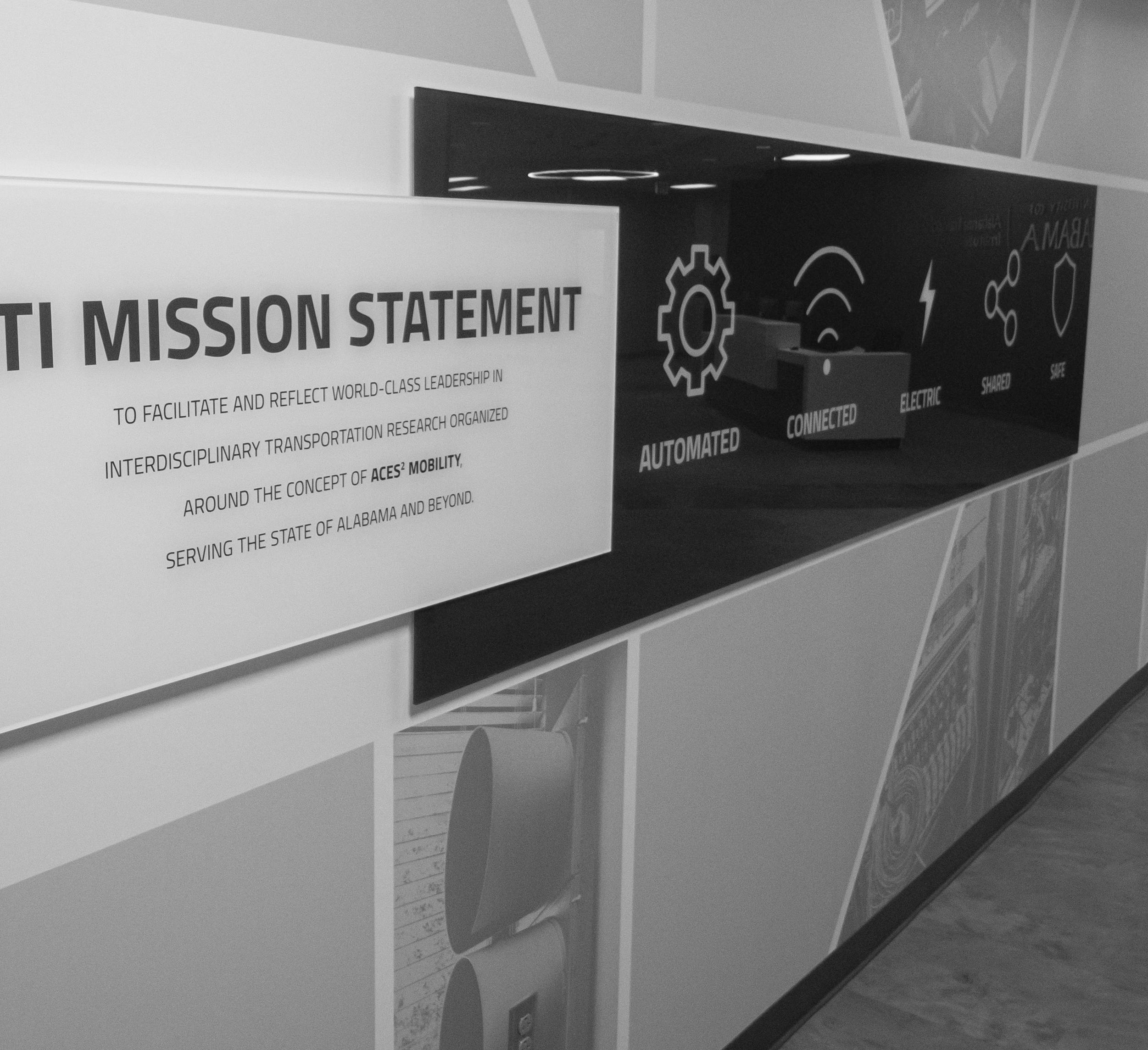
Visit our website at ati.ua.edu, connect with us on LinkedIn, and subscribe to our monthly newsletter.
50% $140M $5M
DIRECT UTC FUNDING FROM USDOT
FEDERAL FUNDING ENABLED WITH ATI SUPPORT

Dr. Steven Jones, the Technology Transfer Director for the Center for Regional and Rural Connected Communities (CR 2C2) and Associate Director of the National Center for Transportation Cybersecurity and Resiliency (TraCR), has over 30 years of extensive experience in transportation engineering and planning. Before his current role, he was named the James R. Cudworth Professor of Civil, Construction & Environmental Engineering at The University of Alabama.
GROWTH IN RESEARCH AWARDS IN FY 2023
Professor, Department of Civil, Construction & Environmental Engineering Interim Executive Director, Alabama Transportation Institute Director, Transportation Policy Research Center
During his distinguished career, Jones has been the principal investigator on $20 million in externally sponsored university projects and authored over 300 publications, including journal articles, conference papers, design manuals, and project reports. His expertise spans the globe.
Jones is a charter member of the American Society of Civil Engineers Transportation and Development Institute, a former chair of its
Public Transportation committee, and an active member of the Transportation Research Board. He serves on its Committee on Rural, Intercity Bus, and Specialized Transportation, and on the Institute of Transportation Engineers Standing Committee on Transit. He is a valued member of the editorial board of the Journal of Transportation Safety and Security.

At ATI, we strive to facilitate and reflect world-class leadership in interdisciplinary transportation research that serves the state of Alabama and beyond.
Our interdisciplinary institute enables Alabama to lead the way on solutions for emerging issues like electric vehicle technologies, automated vehicles, connected infrastructure, various modes of shared mobilities and advancing transportation safety. ATI coined the phrase of ACES2 mobility to represent our concentration. Our research is focused on the future of transportation and seeking impactful findings that will lead to innovative solutions.
ATI works toward developing creative solutions concerning both technology and policy. ATI serves as an independent resource that can develop unbiased information to be utilized by local, state, and national leaders in developing transportation policy. The result is more and better-informed decision-making that leads to innovative, data-driven, cost-effective solutions that advance Alabama’s economy, safety, and quality of life through transportation.
AUTOMATED CONNECTED ELECTRIC SHARED SAFE
Competitions continued in the Indy Autonomous Challenge as part of the PoliMOVE team, an international collaboration between Politecnico di Milano and UA. The 3rd edition of the IAC was held at the Texas Motor Speedway. PoliMOVE took home the grand prize and also won the second annual Autonomous Challenge at CES reaching max speeds of 180 mph, a new world record. They went on to win the first-ever autonomous driving road course time trial competition, held at the Monza “Temple of Speed.” The historic feat took place as part of the Milan Monza Motor Show. UA EcoCAR competed in the EcoCAR Mobility Challenge, the 12th U.S. Department of Energy (DOE) Advanced Vehicle Technology Competition series. This 4-year competition challenged 11 university teams to apply advanced propulsion systems, as well as connected and automated vehicle technology. The team reached SAE Level 2 automation, which applies to a vehicle that has combined automated functions, while the driver remains engaged and monitoring the environment.
Continued to lead a $16.8 million Advanced Transportation & Congestion Management Technologies Deployment (ATCMTD) project sponsored by the Federal Highway Administration (FHWA), called ACTION, in Tuscaloosa County to support developing a connected infrastructure aimed at automated vehicular traffic, resolving congestion challenges, improving safety, and supporting efficient freight delivery for just-in-time manufacturing.
Technical leadership role on an $8.7 million ATCMTD project awarded in 2022 to develop and deploy smart and connected technologies on the Atlantic City Expressway in New Jersey.
Exploring Large-Scale Crowdsourced Connected Vehicle Data to Support Alabama Transportation Decision-Making, funded by ALDOT.
MAGNET, is a project funded by a $1 million planning grant from the a National Science Foundation (NSF) Regional Innovation Engines program. This project is lead by AMP at UA with partners from the University of Georgia and Mississippi State University. The project envisions an innovative supply chain ecosystem where stakeholders from across the EV supply chain can confidently and effectively participate in activities that advance transportation electrification, such as purchasing electric vehicles, increasing grid capacity, increasing charging capability and establishing and growing domestic industry around materials extraction, recycling, and supply chain component and system manufacturing.
Partnering with Alabama Power and Mercedes-Benz U.S. International Inc. to develop and demonstrate ways to use older EV batteries, extending their usable life and reducing their carbon footprint while lessening demand on power grids. With $4 million in support from the United States Department of Energy, the project is also supported by another $4 million in cost-share bringing the project budget to a total of $8 million.
The project to transition to electric buses on the UA campus continues including the research component on various aspects of electrification for bus transportation. The project not only plays a role in helping reduce emissions, but the research and workforce development components, in partnership with industry, strengthen UA and the Tuscaloosa area in becoming a hub for electric vehicles while ensuring the state’s profile for innovation in electric vehicles is strong. UA collaborated with local Tuscaloosa transit agencies to obtain $8 million from the Federal Transit Authority to support the project with $2 million in matching funds from UA.
Preparing First Responders for Future Electric Vehicle Emergencies was the topic of a workshop organized and conducted in 2023 that is part of a project funded by the National Science Foundation (NSF). The workshop was sponsored by NSF and ATI.
Public Charging Infrastructure - Integrating cognitive, social, and engineering principles for large-scale planning of public charging infrastructure is a large project awarded by the National Science Foundation in 2023.
Birmingham-Jefferson County Transit Authority project to study public transportation operations under the Route Recovery and Restoration Program, funded by Federal Transit Administration (FTA).
FTA Project with ALDOT to improve postCOVID rural paratransit operations.
Partnered with the Regional Planning Commission of Greater Birmingham, developed the “Community-driven Regional Mobility Engine for Accessible and Equitable Multimodal Public Transportation in Central Alabama” project, awarded as part of the Strengthening Mobility and Revolutionizing Transportation (SMART) Grants Program.
Part of a team led by Leidos on a successful bid to provide on-call transportation safety research to the FHWA.
Continued to work with law enforcement across AL and in other southeastern states (MS, AR, LA, GA) to develop, maintain, and support a variety of cutting edge safety technologies, including electronic citations, electronic crash reporting, DUI reporting, commercial vehicle enforcement, search tools, and data analytics, enabling the daily operation of over 10,000 sworn officers, over 400 police agencies, over 400 local, circuit and district courts in Alabama alone, as well as traffic safety engineers and related professionals on a statewide basis.
Developing a Near-Miss Reporting System for Roadside Responders is a new project funded by AAA Foundation for Traffic Safety.

AMP x AIDT EV CENTER


ACTION

ELECTRIFY UA CRIMSON RIDE


TUSCALOOSA INFRASTRUCTURE


RIDE-SHARE SERVICE FOR RURAL COMMUNITIES


NSF SMART & CONNECTED COMMUNITIES

INTEGRATED MODELING FOR ROAD CONDITION PREDICTION
TRANSPORTATION POLICY RESEARCH CENTER
DECATUR INFRASTRUCTURE PROACT

BIRMINGHAM TRANSIT


UNIVERSITY BLVD CORRIDOR
BUILD GRANT
REG PLANNING COMMISSION OF GREATER BIRMINGHAM




BUILD BACK BETTER CHALLENGE


WIREGRASS ECONOMIC DEVELOPMENT
ONGOING PROJECTS
CENTER FOR ADVANCED PUBLIC SAFETY



NEW PROJECTS

ALABAMA MOBILITY AND POWER CENTER
REBUILD ALABAMA

TPRC provides services for several needs such as policy and economic impact analysis, assistance with state and federal grant applications, researching legislative best practices, and data compilation and analysis. These services are available to any community in the state of Alabama. TPRC’s primary research areas are focused around legal, finance, equity and progress issues.
CAPS works with state agencies and law enforcement across Alabama and other southeastern states to develop, maintain, and support a variety of cutting-edge safety technologies, including electronic traffic citations and crash reporting, commercial vehicle enforcement tools, data analytics and search tools, enhancing the daily operation of 10,000+ sworn officers, 400 police agencies, and 400 courts in Alabama along with traffic safety engineers and professionals.
“Rebuild Alabama has accounted for record investment represented by 234 projects in all 67 counties, 400 miles of resurfaced roadways, and more than $170 million in state transportation funding awarded to cities and counties.” - Governor Kay Ivey Montgomery Advertiser, March 2023
ati.ua.edu/impact
AMP is an innovative research center focused on the electric vehicle ecosystem. Stakeholders from across the EV supply chain can participate in activities that advance transportation electrification. The combination of significant automotive manufacturers and supplier presence in the southeast, combined with substantial mining capacity for the necessary materials for batteries and other critical EV systems, uniquely positions Alabama as an ideal home for EV research.
ATI supported legislative leaders and the Governor’s office in Alabama on efforts that led to the Rebuild Alabama (Transportation Infrastructure) legislative package being enacted. Rebuild Alabama was authorized to acquire funds for the state to invest in roads and bridges and the Port of Mobile. The state has sent back to cities and counties $170 million through awarded projects, and the total overall revenue is projected to be much higher. More funds will be dispersed for future projects.
Monthly updates on Rebuild Alabama are published in the ATI newsletter and bid information can be found on the TPRC website at tprc.ua.edu.
With a mission to fuel research and workforce development to meet the needs of the burgeoning electric vehicle market, the Alabama Mobility and Power (AMP) Center is a first-of-its-kind public private partnership between UA, Alabama Power, and Mercedes-Benz U.S. International, Inc.
In November 2021, the AMP Center was officially approved by The University of Alabama Board of Trustees. In the time since, AMP has embarked on three major initiatives, made possible by funding from private and public sources — including a $12.1 million investment from the state of Alabama.

To support the existing automotive industry and help it scale into the future, researchers at the AMP Battery Lab will probe all facets of the battery supply chain under one roof. Using state-ofthe-art facilities and instrumentation, they’ll pursue efficiencies at every point in the battery production process — from leaner sourcing of raw materials, to more efficient processing of these materials to create cells, to tighter stacking of these cells into modules and packs, to better recycling and reuse of batteries at the end of their lives.
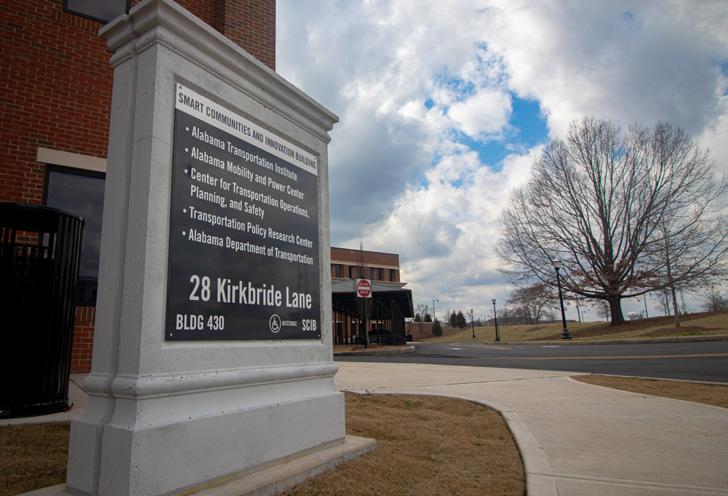

If we are to truly decarbonize the transportation sector, we need to think bigger than an electric car in every garage: we need to make accessible the means to charge these vehicles with renewable energy, both at home and on the road. Outfitted with a working micro-grid, solar array, charging infrastructure, and more, the AMP Power Lab will enable researchers — both from UA and in-residence from peer institutions — to test and expand the capabilities of the power grid to sustainably support the EV industry.

Standing at the crossroads between new technologies, new industries, and new entrants into the skilled workforce, we recognize an urgent need for new curricula, new training techniques, and new credentials. As a joint venture of academia, industry, and government, the AMP National Training Center will develop K-12, 2-year, and 4-year education programs to steer the next generation toward success in electric vehicle and battery technologies.
Established AMP is proud to offer our partners the opportunity to join the only consortium of industry, government, and academia addressing the entire electric vehicle ecosystem. Learn more at amp.ua.edu/consortium.
AMP developed an Alabama EV adoption forecasting tool capable of predicting EV adoption across the state with 95% confidence. This tool also allows economic developers to forecast industry growth and educators to forecast workforce requirements.
AMP’s business intelligence center used the EV adoption tool to provide the state with a forecast of fuel tax revenue reductions as a function of the growth and adoption of EVs statewide. AMP, in conjunction with TPRC, is now conducting follow-up research to mitigate the pending tax revenue issues.
With the Economic Development Partnership of Alabama (EDPA), AMP created a model to strategically target OEMs within the battery industry. This strategy has been successfully wielded to identify industry partners well-suited to Alabama.
The Alabama Department of Commerce has partnered with AMP and Alabama Industrial Development Training (AIDT: Alabama’s workforce training agency), to successfully persuade businesses to relocate or expand into Alabama, opening new avenues for economic development.
AMP,theAlabamaBusinessIntelligence Center(ABIC),andAIDTareworking collaborativelytocreateaworkforce needsassessment.Thisassessmentarms K-12schools,communitycolleges,and four-yearinstitutionswithappropriate learningoutcomesfortheirstudents.
Simultaneously,theresultsoftheassessmentwillgenerateinsightsforstate andindustrydecision-makers,asthey preparetowelcomethenextgeneration ofworkforceentrantsseekingcareersin theEVindustry.
Amidfiercecompetition,AMPled thechargetowinaNationalScience FoundationgrantforUA.Ourentryfor theRegionalInnovationEngineprogram iscalledMAGNET:Mississippi,Alabama, andGeorgiaNetworkforElectricVehicle Technologies.
This$1millionTypeI(planning)grant laysthegroundworkforaTypeIIgrantof upto$160million,disbursedover 10years.Withthesefundssupporting unprecedentedresearchandcommercializationoftechnologiesrelatedtoelectric vehicles,wehopethisgrantwillleadto significanteconomicdevelopment opportunitiesandemployment— specificallyinruralAlabama.
Learnmoreatmagnet.ua.edu.
In 2023, AMP developed a strategic plan to chart the direction of the Center and establish AMP as a hub for EV innovation in Alabama.
The plan sets forth AMP’s strategic vision, identifies key outcomes, lays out strategic initiatives, and details eight key action items.
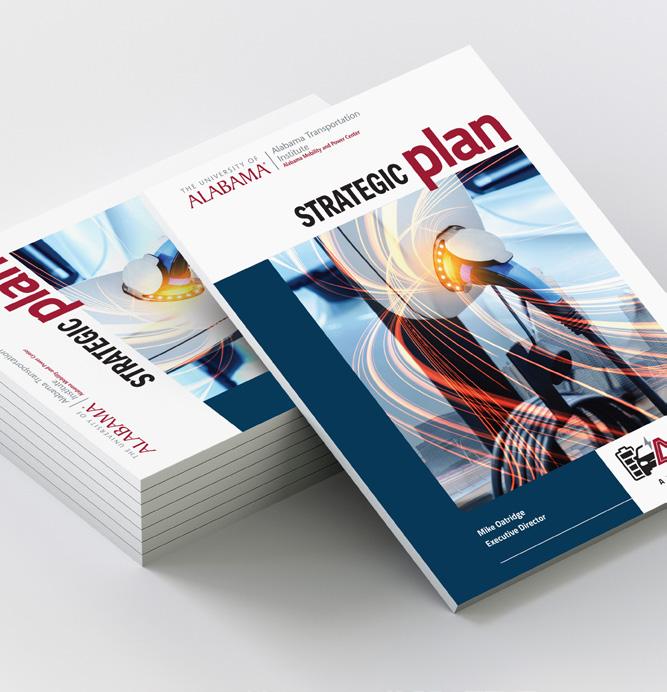

ATI’s involvement in two successful University Transportation Center teams, representing $50 million in federal funding for transportation research, with ATI directly receiving $5 million, highlights ATI’s growing influence on the national stage.
The U.S. Department of Transportation invests in the future of transportation through its University Transportation Centers (UTCs) Program. Since 1987, this program has awarded grants to consortia of colleges and universities nationwide. These consortia collaborate to advance transportation research and technology, fostering the development of the next generation of transportation professionals.
UTCs, consisting of two- and four-year institutions, focus on specific research topics to create centers of transportation excellence. Through education,
In 2023, the USDOT Federal Highway Administration awarded a five-year, $7.5 million grant to establish the multi-institutional Center of Excellence on New Mobility and Automated Vehicles.
The new center is led by the UCLA Institute of Transportation Studies and includes The University of Alabama, Carnegie-Mellon University, along with government and private sector partners. Learn more on the web at mobilitycoe.org.
research, and technology transfer, they contribute to the advancement of U.S. expertise in transportation, addressing the growing need for safe, efficient, and environmentally friendly movement of people and goods. Recognized internationally for their leadership and innovation, UTCs play a crucial role in transforming and enhancing the nation’s transportation system to align with economic, environmental, and societal goals.
The UTC program is one of the most prestigious and highly competitive research efforts sponsored by the USDOT.


Internationally recognized for their capacity to lead, innovate, and educate, UTCs continue to enhance and transform our transportation system, keeping it in step with our nation’s economic, environmental, and societal goals.

North Carolina A&T State University was selected to lead the Center for Regional and Rural Connected Communities with support from Clemson University, Florida Atlantic University, The University of Alabama, University of Georgia, University of Kentucky, and University of Tennessee, Knoxville.
With a federal investment of $15 million over five years, their mission is to revolutionize connected and coordinated multimodal solutions, fostering equitable and efficient mobility in rural and underserved communities across North Carolina, Alabama, Florida, Georgia, Kentucky, Mississippi, Puerto Rico, South Carolina, and Tennessee.
The goal is clear: innovate, educate, and improve transportation for both people and goods and focus on creating advanced multimodal solutions to enhance fair, efficient, and effective mobility services.


The U.S. Department of Transportation will invest $20 million over five years into the TraCR. This initiative aims to research, develop, and test robust software and hardware to defend our increasingly connected transportation system against cyber threats from hackers, criminals, and terrorists.
Additionally, TraCR will focus on policy issues around transportation cybersecurity, and the Transportation Policy Research Center at ATI is leading this effort.
TraCR is led by Clemson University and includes Benedict College, Florida International University, Morgan State University, Purdue University, South Carolina State University, The University of Alabama, the University of California, Santa Cruz, and the University of Texas at Dallas.
INNOVATE | EDUCATE | IMPROVE RESEARCH
UA will compete in the prestigious Battery Workforce Challenge, a national competition focused on designing, building, testing, and integrating advanced battery packs into commercial electric vehicles. UA is among 12 North American universities selected for this immersive BattChallenge, managed by Argonne National Laboratory and supported by the U.S. Department of Energy and industry partners like Stellantis.
This hands-on competition, spanning three years, aims to equip students with essential engineering, project management, and communication skills for the growing EV and battery industry. Dr. Jaber Abu Qahouq, the lead faculty advisor, emphasizes the invaluable knowledge and experience students will gain through this challenge, positioning them for promising careers in the EV sector.
The transition to electric mobility has created a demand for skilled professionals in the EV battery workforce, estimated to exceed 230,000 jobs by 2030. The Battery Workforce Challenge Program strives to meet this demand by providing students with practical battery design and integration experience, extending beyond traditional engineering curriculum boundaries.

Teams will design, build, test, and integrate an advanced battery pack into a production Stellantis vehicle.
UA’s team, supported by the College of Engineering, the ATI, and other entities, will collaborate with Shelton State Community College. They will tackle real-world challenges in battery engineering and manufacturing, contributing to the development of a highly skilled and diverse domestic workforce. This student-focused initiative aligns with UA’s commitment to lead in transportation electrification through research, development, and education in EV and battery technologies. The university’s strong faculty team, led by Dr. Abu Qahouq and Dr. Krishna Shah, is geared up for a transformative journey in the exciting field of electric mobility.
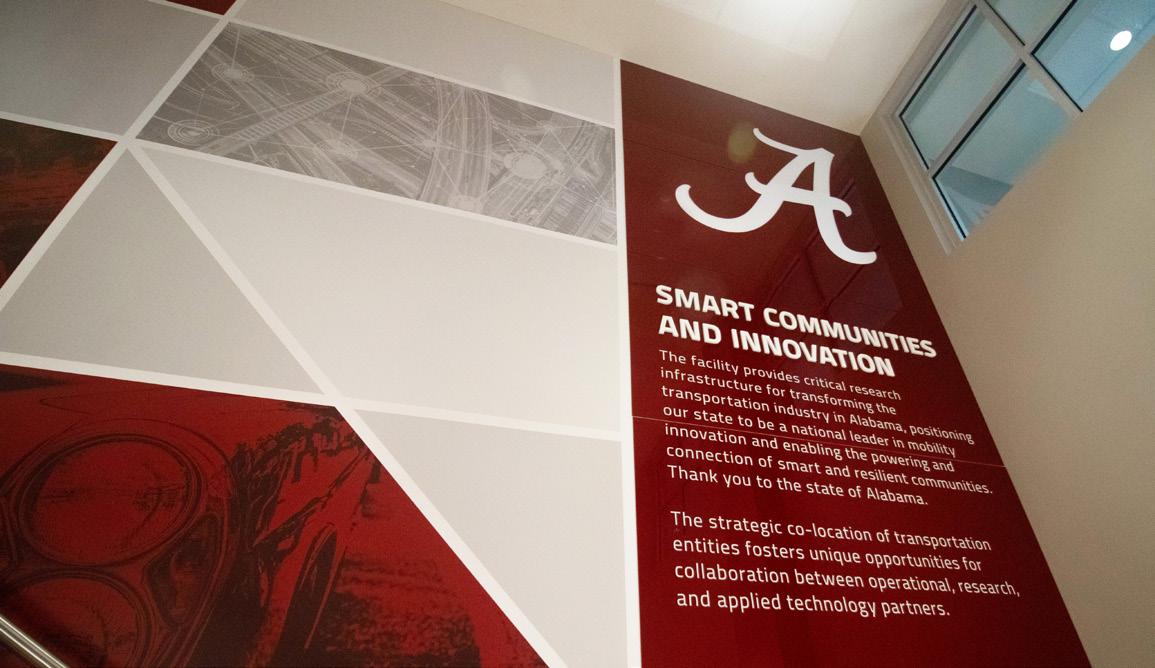
GRAND OPENING ANNOUNCEMENT COMING IN 2024
The Smart Communities and Innovation Building provides critical research infrastructure for transforming the transportation industry in Alabama, positioning our state to be a national leader in mobility innovation and enabling the powering and connection of smart and resilient communities.
SCIB was built as part of a $16.5 million bond announced by Governor Kay Ivey in July 2021. The strategic co-location of transportation entities fosters unique opportunities for collaboration between operational, research, and applied technology partners.
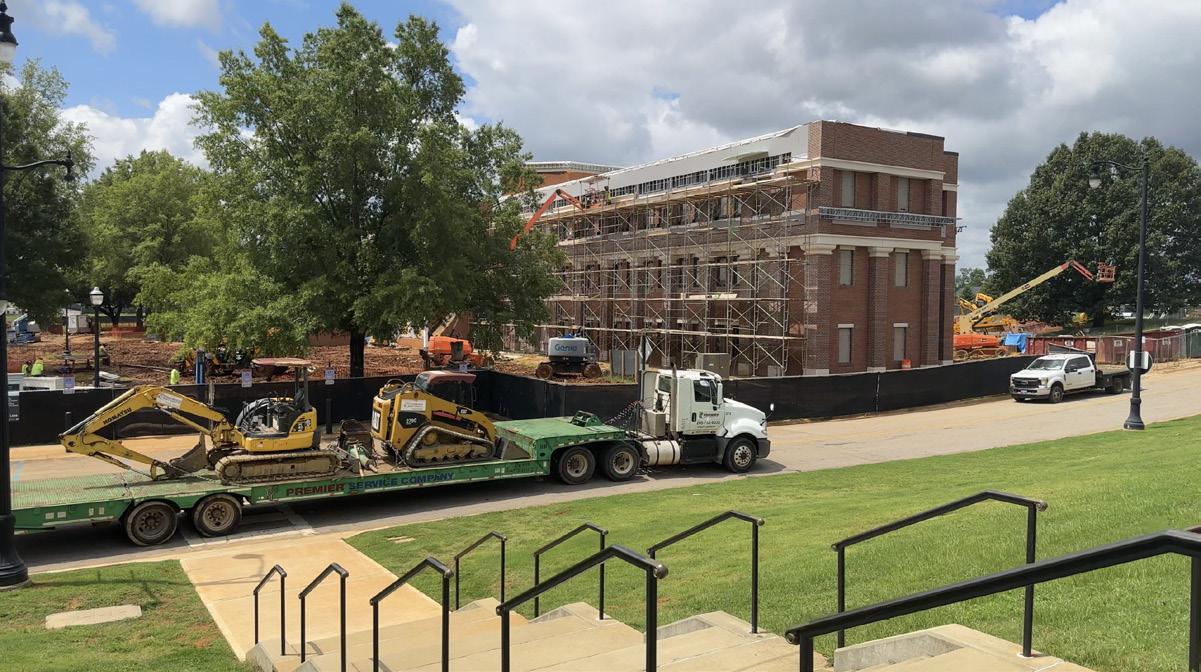
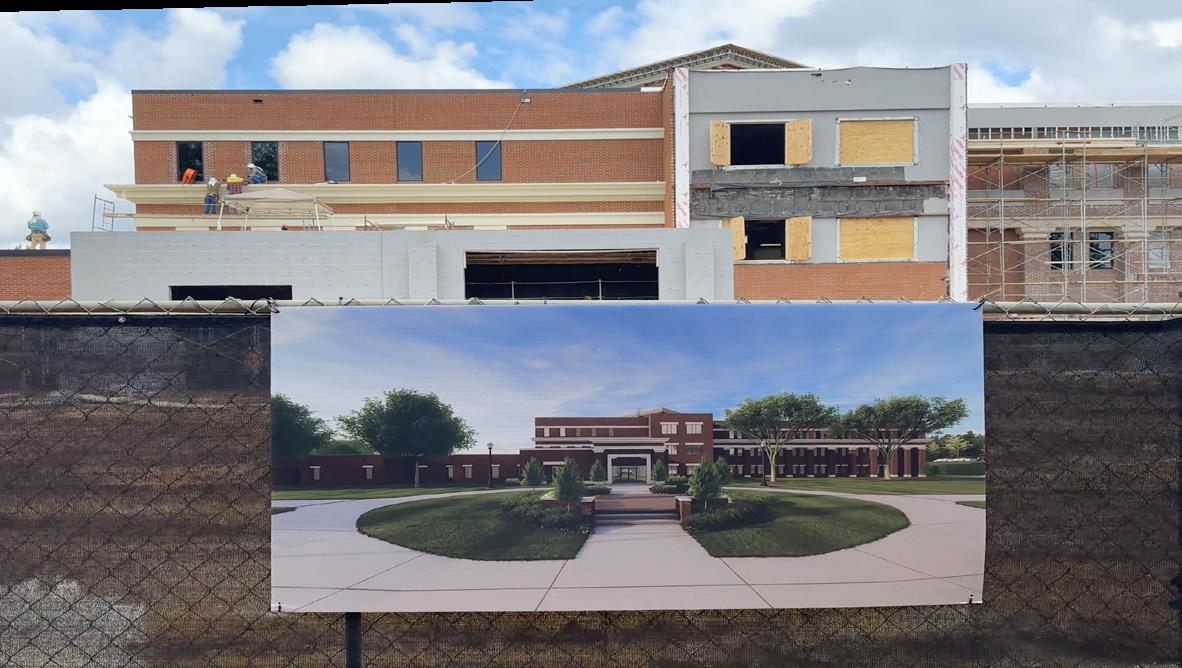
The future of transportation in Alabama combines research, innovation, technology, and policy. The SCIB initiative will have a profound impact on workforce development and economic development in a targeted industry vital to the state.
